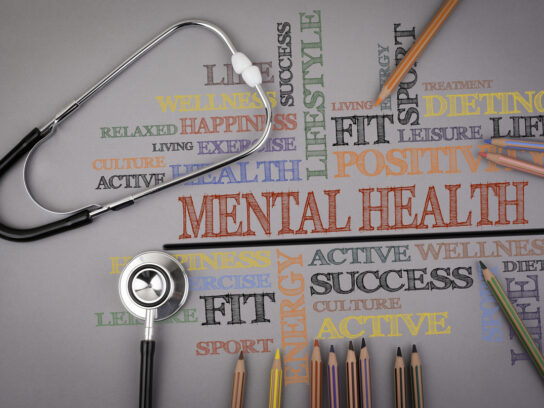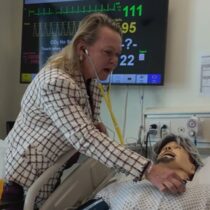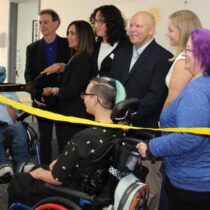
The stigma associated with seeking medical assistance for a mental health issue is often heightened in communities of color. The late Bebe Moore Campbell understood that very well. She was a reknown novelist, journalist and teacher who wrote a number of books addressing racism, mental health, and the importance of community. She also had a close family member who struggled with a severe mental health issue.
Campbell also co-founded the National Alliance on Mental Illness (NAMI) chapter in Inglewood, California, a predominately African-American suburb of Los Angeles. “Campbell fearlessly challenged the status quo, shedding light on the unique struggles faced by people of color and advocating for their voices to be heard,” according to a statement on NAMI’s website.
Back in 2008, the U.S. House of Represenatives officially recognized July as Bebe Moore Campbell National Minority Mental Health Awareness Month.
The Food and Drug Administration also is shining a light on the mental health challenges ethnically diverse populations face in America.
“In 2020, fewer than one in every two African-American adults got care for mental health. In 2018, Asian Americans were 60 percent less likely to receive mental health treatment than non-Hispanic Whites. Obstacles for many include a lack of health insurance, less access to treatment, and stigma,” the FDA pointed out on its website.
Challenges in Black and Brown Communities
MCM spoke with Dr. Yeside Ojo, a psychiatric and family nurse practitioner who is CEO of Novum Health Services in Glen Burnie, Md. Ojo also serves with the Black Physicians and Healthcare Network (BPHN) which is part of the National Center for Children and Families (NCCF) headquartered in Bethesda.
She explained Minority Mental Health Awareness Month is a reminder that mental health can impact individuals from various backgrounds.
While mental well-being can impact all people, Ojo said people from Black and Brown communities face specific challenges.
“Although mental health is universal to all, it affects ethnic minorities at a different pace. We frequently face distinct obstacles, including stigma. There also is a lack of culturally competent care, language barriers, and limited access to quality mental health care resources,” Ojo explained.
Minority and ethnic populations often are reluctant to seek care because of cultural bias. These biases stem in part from a longstanding mistrust of the healthcare system. That’s because of government practices in the past like the Tuskegee experiment on African -American men, and the sterilization of Puerto Rican women. Both actions took place in the 20th century, and these events while in the past, can influence personal healthcare decisions today.
Among some ethnic minorities, family traditions are strong and influence how people approach health care, said Ojo. People avoid looking to the outside for help and instead will internalize their problems.
“There is this stigma affiliated with seeking help. If I’m seeking mental health, its deemed more as a sign of weakness, as opposed to showing strength, vulnerability, and being transparent,” Ojo said.
Black Physicians and Healthcare Network Offers Help
MCM also spoke with Robin Little who is the program director with BPHN.
“The reason why we are such an important resource in Montgomery County is because we give Black and Brown residents the opportunity to connect with health providers that look like them, and can understand their environment and things they have gone through in their life,” Little said.
While it is difficult to overcome intergenerational stress in some families, Ojo believes BPHN and others in the community are making a difference.
“We’re more open, we’re more aware, there’s more education. We’re actually changing the language we use. As opposed to saying mental illness, we’re now saying mental health conditions. We are softening the language, and the perspective of what mental health encompasses,” Ojo said.
Celebrities Speak Out About Mental Health Struggles
It also has helped that some notable figures have stepped forward about their own mental health issues. Serena Williams, Simon Biles, and Naomi Osaka are among some celebrities who have recently talked publicly about their mental health struggles. Ojo said when athletes or celebrities highlight their problems it makes it easier for the general public to relate because these public figures “appear human just like the rest of us.”
Men and Women Address Problems Differently
When it comes to mental health, men and women often deal with the issue differently.
“Men tend to downplay their mental health. They feel like they don’t have any issues going on. It’s going to go away on its own. However, women are more open and more likely to seek help. Women like to verbalize what they are going through with their friends, family members, and their community,” Ojo said.
Costs and Access to Health Care
Access to health care is another big challenge in many minority communities. Recent research shows about 10 percent of Black Americans lack health insurance compared to 5.2 percent of non-Hispanic Whites. Some people in Black and Brown communities do not have the same access to transportation or the same work flexibility that other people might have in accessing care. In some cases, language differences also create barriers.
“High out-of-pocket costs also are a problem. Sometimes people can afford a part of the insurance, but not the part that covers mental health. BPHN has been able to close the gap on some of those disparities by offering access to culturally competent providers. We’re also willing to help with some of the out-of-pocket costs. We can offer transportation because we want the community to know that your mental health is just as important as your physical health. It is part of your whole well-being: mind, body, and spirit,” Little explained.
Understanding the Challenges and Addressing Them
Diverse communities face challenges that other groups may not experience such as poverty, racism, and systemic oppression, explained Ojo. She said these issues can contribute to higher rates of post-traumatic stress disorder (PTSD) in these communities.
She believes it is critical for people to start conversations early about mental health.
“The more we speak openly about it, the more that we know this is real and this is universal–having better access to care, all of these things can make a significant difference,” Ojo said.
Little added that it is important for people to learn how to advocate for themselves. If people are struggling with their mental health, people need to speak up and tell someone what is happening. That way they can get the help they need. She said sitting silent is not the answer because over time people will suddenly erupt like a volcano. That is unhealthy, noted Little.
BPHN is one resource people in the Black and Brown communities can turn to for help.
The Chinese Culture and Community Service Center (CCACC) in Gaithersburg is also a nonprofit resource.
Contact these organizations, or visit the Montgomery County Mental Health Resources for Public Safety website, for more information.


Comments are closed.